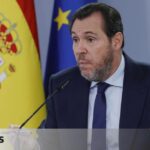
“Repeal the ‘sanchismo’.” This is the new motto devised in the machine room of the national headquarters of the PP. The strategists of Alberto Núñez Feijóo turn to discursive formulas that allow them to continue stoking the coalition government and its president, Pedro Sánchez, without compromising the options of their candidates in the regional and municipal elections on May 28, dependent as they are on the transfer of socialist votes to conquer new seats. The formula allows the strategy of turning 28M into a preview of the generals, but hides the real intentions of the right if it comes to power.
Ayuso tries to stretch out the clash with the Government for Dos de Mayo while Feijóo seeks to settle it
Further
The clearest and most recent example has occurred in Andalusia with the law of Juan Manuel Moreno Bonilla to legalize irrigation in the area of the Doñana National Park. A community whose government is not at stake in these elections, but where the PP hopes to complete the historic turn of the absolute majority and transfer it to its eight provincial capitals, in addition to other large towns.
“The Andalusian capitals can be one of the great joys of election night,” they point out at the headquarters on Calle de Génova in Madrid. In the PP they dream of giving a coup in the most populated region of Spain and former barn of leftist votes. Andalusia would open the Moncloa door for Feijóo given his difficulties in penetrating Catalonia and Euskadi.
There lies the collection of cable in various phases of Moreno with the law of Doñana. Only the one who was his right hand in the PP and the Junta in the previous legislature, Elías Bendodo, maintains from Madrid the strategy of accusing the coalition government of launching a ‘fake news’ campaign against Moreno. The statement contrary to the norm signed by the EU Commissioner for the Environment, as well as the support he received from the president of the Commission, Ursula Von der Leyen, forced the right to back down from its parliamentary alliance with Vox.
For the moment, the Government of Moreno has chosen to freeze the parliamentary process, after having insisted for days that everything was fine. The warning from the EU, which came on the same day that the party’s national spokesman, Borja Sémper, announced that Brussels would not say anything until the law was passed, was the straw that broke the camel’s back. And it provoked an unprecedented attack by the European PP on the president of the Commission, leader in turn of that European PP.
Does that mean that the Andalusian PP has given up approving its law? Not seem. In fact, the processing will restart two days after the elections. Moreno is just trying to get him out of the electoral campaign equation. If in the early stages of the controversy many regional and state leaders mockingly pointed out that the PP was going to burst the polls in Huelva, the latest twist seems to point to new electoral accounts warning of an adverse effect in other latitudes, both Andalusian like from other places.
What does “repeal the ‘sanchismo’” mean?
The attempt to get Doñana out of the headlines 20 days before the elections and in one of the toughest droughts in recent decades has not come alone. In the PP they handle dozens of surveys, their own and others, and Feijóo has a leading sociologist who is an expert in the matter as a shadow advisor: José Ignacio Wert.
And what do the numbers say? That the PP can sweep away on May 28. Or not. That you can earn a lot, or nothing. Even that some important square can give a negative surprise. “The ball will hit the crossbar and we’ll see if it goes in or not,” the party’s spokespersons regularly summarize, in a football simile that explains very well the state of mind at the Génova street headquarters.
The distribution of all municipal power and a good part of the regional power for the coming years will be in a handful of votes. It can materialize in a disputed deputy in Ciudad Real or Guadalajara, in the rest in Alicante or in the last councilor of some of the municipalities in the south of Madrid that Isabel Díaz Ayuso saw as easy to win a year ago, and now not so much.
“These elections are between the ‘Sanchista’ party and the PP,” Feijóo said this Friday in Melilla. “Many socialist voters don’t want to repeat four more years,” he added.
The distinction between “sanchista” and “socialista” is not trivial. Feijóo has been doing it for months. He knows that his options in May, but especially in December, go through attracting progressive voters who hesitate to support Pedro Sánchez again.
This aspiration of Feijóo to attract voters on the left is contradicted by the messages that insult democratic memory and to which the main leaders of the PP frequently resort, with great virulence in the case of Ayuso, for example. Feijóo himself promised to “repeal” the Democratic Memory Law. The ‘trans law’. Or the educational law. Also that of ‘only yes is yes’. And all of them appeal to the ideology of the left in regards to the conquest of rights.
That precision has disappeared. In the PP they are now tied to the technicality that a law cannot be “repealed” without further ado, but the reality is that the slogan has changed. Laws are no longer repealed, but “the ‘sanchismo’”.
Sémper said so expressly about the law of only yes is yes, which the PP spokesman accepted as good with the counter-reform agreed with the PSOE, PNV, Ciudadanos and Junts. Management sources have also pointed out that the Democratic Memory Law will not be eliminated, but that some points may be touched on.
There are more examples: on abortion, Feijóo himself said that the PP assumes the law of deadlines, and that it would only touch on what refers to 16 and 17-year-old girls. Or about the ‘trans law’, anathema during a good part of the legislature that is now not going to disappear entirely, given that the PP has approved some of the regulations on the matter that govern the autonomous communities. For example, in Galicia. Feijóo has gone from defending “good people” who were supposedly offended by the trans law to leaving up in the air what he will do with this rule. Of course: Feijóo wants to pathologize trans people again.
Another law in doubt was that of euthanasia. But there is no longer talk of specific rules. And the subterfuge sought by the PP to avoid responding to the repeals after the change in strategy has been to ensure that a list of counter-reforms to be carried out in case of reaching the Government is being prepared. As long as it is not finished, it will not communicate. Who does it? An unknown group of experts. When will it be? It is not known.
But since you have to go to the elections with material to throw at your opponent, especially if you come from the opposition, the PP has found a discursive formula: “repeal sanchismo.” In “form and substance”. And do “things right”, instead of “bad”.
“Repealing sanchismo implies repealing all the mistakes made in these five years,” Feijóo said in Melilla. If the Galician leader does not stand out for his concretion, less so in electoral times. And if the result of 28M can be uncertain until the councils are constituted a couple of weeks later, much less.
Source: www.eldiario.es

